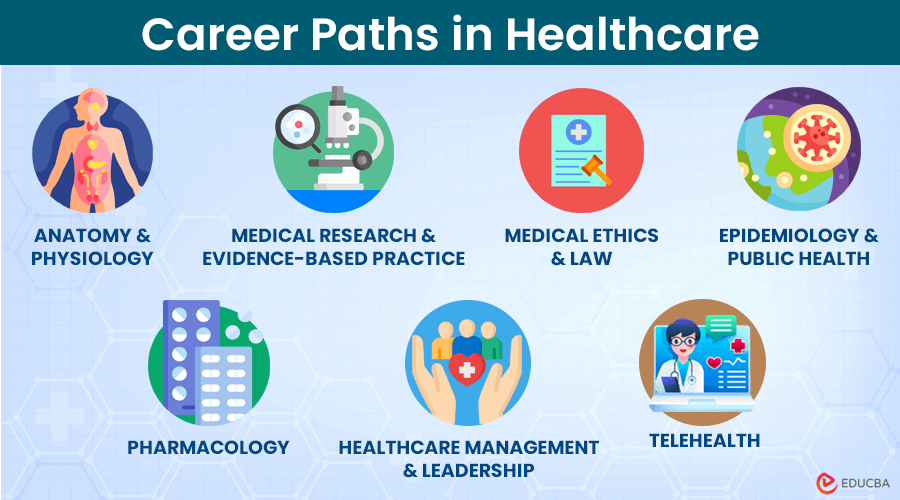What are the Different Career Paths in Healthcare?
The healthcare field offers various career opportunities, catering to individuals with different interests, skills, and educational backgrounds. It also offers various opportunities for people who want to make a positive impact on others’ lives, whether through hands-on patient care or administrative duties. Let us delve into some of the available diverse career paths in healthcare.
Top Career Paths in Healthcare
Here are some top career paths in healthcare:
#1. Anatomy and Physiology
Anatomy and physiology are the foundations of healthcare professions. They involve the study of the structure and function of the human body. Professionals in this field may work as anatomists, physiologists, or healthcare educators.
How to Pursue?
- Obtain a Bachelor’s degree in biology, anatomy, physiology, or a related field.
- Pursue a Master’s or Ph.D. degree for research or teaching positions.
- Gain practical experience through internships or laboratory work.
#2. Pharmacology
Pharmacology is the study of how drugs impact living organisms. Professionals in this field develop, test, and administer medications, ensuring their safety and efficacy.
How to Pursue?
- Earn a Bachelor’s degree in pharmacology, pharmacy, or a related field.
- Consider pursuing a Doctor of Pharmacy (Pharm.D.) for clinical roles.
- Gain experience through internships or residencies in pharmaceutical companies or healthcare settings.
#3. Medical Ethics and Law
Medical ethics and law focus on ethical dilemmas and legal issues in healthcare practice and research. Professionals in this field work as healthcare ethicists, legal advisors, or policymakers.
How to Pursue?
- Obtain a Bachelor’s degree in ethics, law, healthcare administration, or a related field.
- Pursue a Master’s or Juris Doctor (JD) degree for specialized knowledge.
- Gain practical experience through internships or fellowships in healthcare institutions or legal firms.
#4. Epidemiology and Public Health
Epidemiology and public health involve the study of disease patterns and factors influencing health outcomes in populations. Professionals in this field work as epidemiologists, public health researchers, or policymakers.
How to Pursue?
- Earn a Bachelor’s degree in public health, epidemiology, or a related field.
- Pursue a Master’s or Ph.D. degree for research or leadership roles.
- Gain experience through internships or research assistant positions in public health organizations or research institutions.
#5. Medical Research and Evidence-Based Practice
Medical research advances medical knowledge through scientific inquiry and experimentation. Professionals in this field conduct clinical trials, analyze data, and publish findings to inform evidence-based practice.
How to Pursue?
- Obtain a Bachelor’s degree in biology, biochemistry, medicine, or a related field.
- Pursue a Master’s or Ph.D. in medical research or a specific area of interest.
- Gain research experience through internships, fellowships, or research assistant positions in academic institutions or research laboratories.
#6. Healthcare Management and Leadership
Healthcare management oversees facilities, personnel, and operations to deliver efficient, quality care. Professionals in this field work as healthcare administrators, managers, or executives.
How to Pursue?
- Earn a Bachelor’s degree in healthcare administration, business administration, or a related field.
- Pursue a degree in Master’s in healthcare management or an MBA with a healthcare focus.
- Gain practical experience through internships or entry-level healthcare administration or management positions.
#7. Telehealth
Telehealth utilizes technology to deliver healthcare services remotely, improving access to care and patient outcomes. The emergence of telehealth technology has transformed healthcare delivery and introduced fresh considerations for reputation management for doctors. Professionals in this field work as telemedicine providers, healthcare IT specialists, or telehealth program managers.
How to Pursue?
- Obtain a Bachelor’s degree in healthcare informatics, computer science, or a related field.
- Pursue certifications in telehealth or healthcare IT.
- You can get experience through internships or entry-level positions at telehealth companies, healthcare organizations, or IT departments.
Final Thoughts
There are numerous career paths in healthcare, each providing distinctive chances to affect people’s lives positively. Whether you are drawn to hands-on patient care like nursing or medicine or prefer roles in research, administration, or technology, there’s a suitable role for everyone.
However, staying open to learning and adaptability is crucial for success in this field. And remember that regardless of your chosen path, your contributions can deeply influence the health and happiness of individuals and communities.
Recommended Articles
We hope this article on “Career Paths in Healthcare” was helpful to you. To learn more, refer to the articles below.




